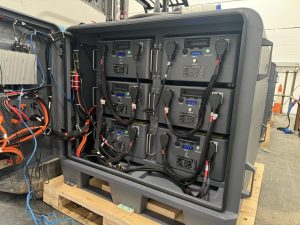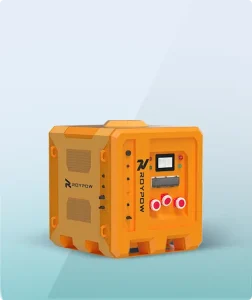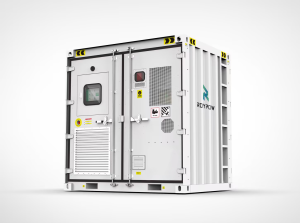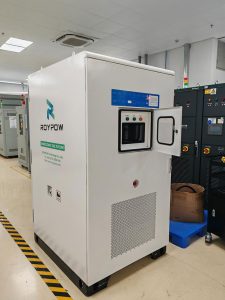Battery Energy Storage System
The RoyPow Power Store. units are Lithium-ion battery storage systems that contain everything to be used straight away. They contain a high quality hybrid power inverter that is capable of a 8 kVA continuous output. It has a fast recharge for all outputs and multiple capacities to suit different power usages. The equipment has no emissions or noise when in use and can be coupled with a generator or charged via the grid or a renewable resource. Each unit also features a battery managment (BMS) and energy managment (EMS) system that can report on use, state of charge (SOC) and relay data on use and cost savings. The BMS offers information on the batteries and state of health to ensure optimal charge and long life expectancy. Maintanence is minimal with good protection, transportation and storage. Each Power Store. has a steel powder coated canopy that is rated to IP54 and its internal components are rated to IP65. It has a LCD display incoporating the EMS panel to allow the user to fault find and much more.
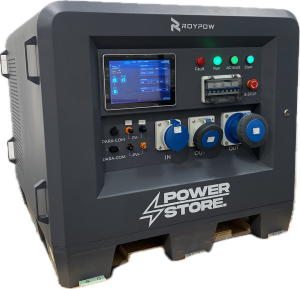 hire from £350 per week
hire from £350 per week
 hire from £350 per week
hire from £350 per week
 hire from £350 per week
hire from £350 per week
Hybrid Power
Hybrid power systems that incorporate a generator typically combine renewable energy sources (such as solar or wind power) with a backup generator powered by fossil fuels (such as diesel or natural gas). These systems are designed to provide reliable electricity supply while also taking advantage of the benefits of renewable energy.
Here's how a hybrid power system with a generator typically works:
- Renewable Energy Sources: The system includes one or more renewable energy sources, such as solar panels or wind turbines, which generate electricity when the sun is shining or the wind is blowing. This electricity is used to power electrical loads or charge energy storage devices like batteries.
- Energy Storage: In addition to renewable energy sources, hybrid systems often incorporate energy storage devices, such as batteries, to store excess energy generated during periods of high renewable energy production. This stored energy can be used later when renewable energy production is low or during times of high demand.
- Generator Backup: A generator, typically fueled by diesel or natural gas, serves as a backup power source in situations where renewable energy production is insufficient to meet demand or when energy storage is depleted. The generator can automatically start and provide electricity to the system to maintain power supply during extended periods of low renewable energy production or high demand.
- Control and Management System: A control and management system oversees the operation of the hybrid power system, monitoring energy production, demand, and storage levels. It automatically adjusts the operation of renewable energy sources, energy storage devices, and the generator to optimize system performance, minimize fuel consumption, and ensure reliable electricity supply.
Hybrid power systems with generators offer several advantages:
- Reliability: The backup generator provides a reliable source of electricity, ensuring continuous power supply even when renewable energy production is limited or unavailable.
- Fuel Efficiency: By integrating renewable energy sources and energy storage, hybrid systems reduce reliance on the generator and minimize fuel consumption, leading to cost savings and reduced environmental impact.
- Reduced Emissions: While the generator may still produce emissions when operating, hybrid systems overall reduce greenhouse gas emissions compared to conventional diesel generators by incorporating renewable energy sources.
- Energy Independence: Hybrid systems reduce dependence on external energy sources by utilizing locally available renewable resources, enhancing energy security and resilience.
Overall, hybrid power systems with generators offer a flexible and sustainable approach to meeting electricity demand, particularly in remote or off-grid locations where access to grid electricity is limited.
